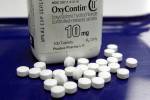High school drug testing promoted
The White House deputy drug czar urged school officials Tuesday to consider a federal grant program for randomly drug testing high school students involved in extracurricular activities.
"We want schools to decide for themselves whether or not they think this will be effective," said Bertha Madras, deputy director of the Office of National Drug Control Policy. "The goal is to deal with this as a public health problem and not a policing problem. And above all, to prevent."
Madras made her comments before speaking to educators from 18 states at Cashman Center. The proposal drew mixed reaction from Clark County School Board members and criticism from the ACLU of Nevada and a nonprofit drug policy group.
Madras said there are 497 schools nationwide that receive federal funding for drug testing purposes. An additional 500 more schools test for drugs without federal aid. She encouraged school officials to apply by a May 8 deadline for some of the $1.6 million in grants available to public and private schools.
There are no high schools in Nevada that tap the federal funding for random drug testing, she said. Clark County public high schools do not randomly test for drugs.
Madras said a 2002 Supreme Court ruling allows the use of random drug tests for students in extracurricular activities and sports under the conditions that the drug results remain private and school officials refrain from punishing students for testing positive. The federal government has given out $35 million in grants since 2003, she said, and there is no evidence that school or health officials are abusing guidelines of the program.
"Drug test results don't go to future colleges. They don't go to future employees," Madras said. "They only go to people who have a right to know, parents and someone who can help."
But the federal program drew criticism from some who said the program was an invasion of privacy.
"I'm not crazy about that idea," said Clark County schools Trustee Terri Janison, who did not attend the summit. "It's invasive. I understand giving random drug tests to students who had issues in the past ... but not just for every student who decides to participate."
Trustee Mary Beth Scow, who also did not attend the summit, said she is "very open" to the possibility of bringing the federal program to Clark County because of its focus on treating students.
"It could help kids stop problems when they're still small problems," Scow said. "It could save kids."
Clark County high school athletes must sign a form that says they won't use or abuse drugs.
From September through March, there were 449 students who were recommended for expulsion by a school principal for possessing, distributing or having the intent to distribute drugs on campus property or school functions, said Edward Goldman, the district's associate superintendent of the Education Services Division. That figure is on pace with the 570 students who were recommended for expulsion for drug-related purposes during the 2005-06 school year.
Allen Lichtenstein, general counsel for the ACLU of Nevada, said random drug tests are an invasion of privacy, expensive and sometimes inaccurate. There also is the potential for abuse in the federal program because some student information might not be kept confidential, he said.
Lichtenstein added that schools should take a narrower approach in the fight to combat drug use and concentrate on helping students who display signs of abusing drugs.
"What makes much more sense is to have a focused approach rather than something that feels good but serves nobody's interest other than the people making money on the testing," he said.
Jennifer Kern, a research associate with the Drug Policy Alliance, a nonprofit group based in New York, said random drug tests also might have the undesired effect of deterring students from participating in extracurricular activities. Kern, who also said the federal program is unproved, said students who abstain from drug use might still refuse to participate in after-school activities because the tests can be humiliating and invasive, and students might object solely on principle.
"The policy can do much more harm than good," Kern said. "Extracurricular activities are the activities that have been proven most effective in preventing problems with substance abuse."




























